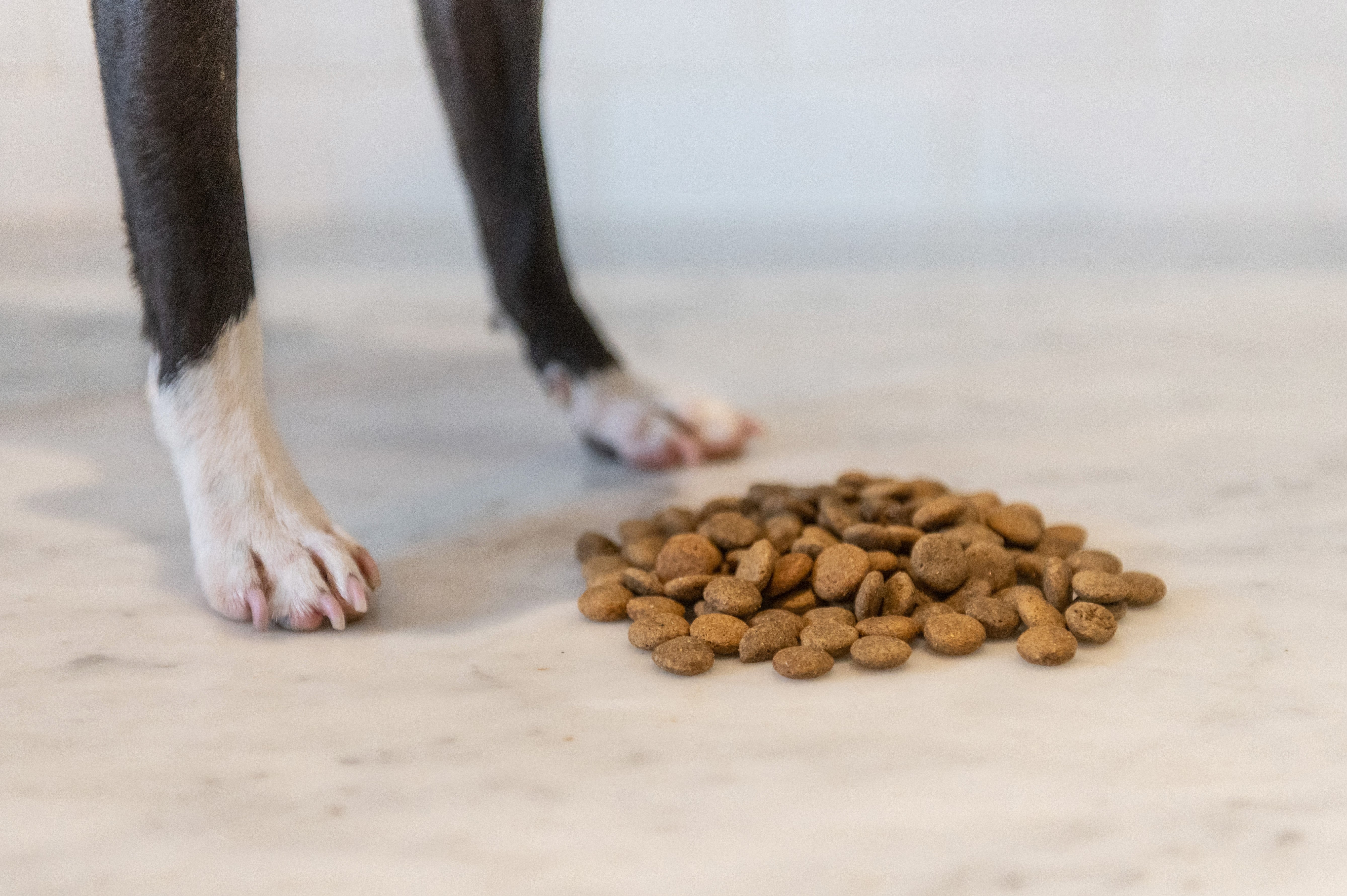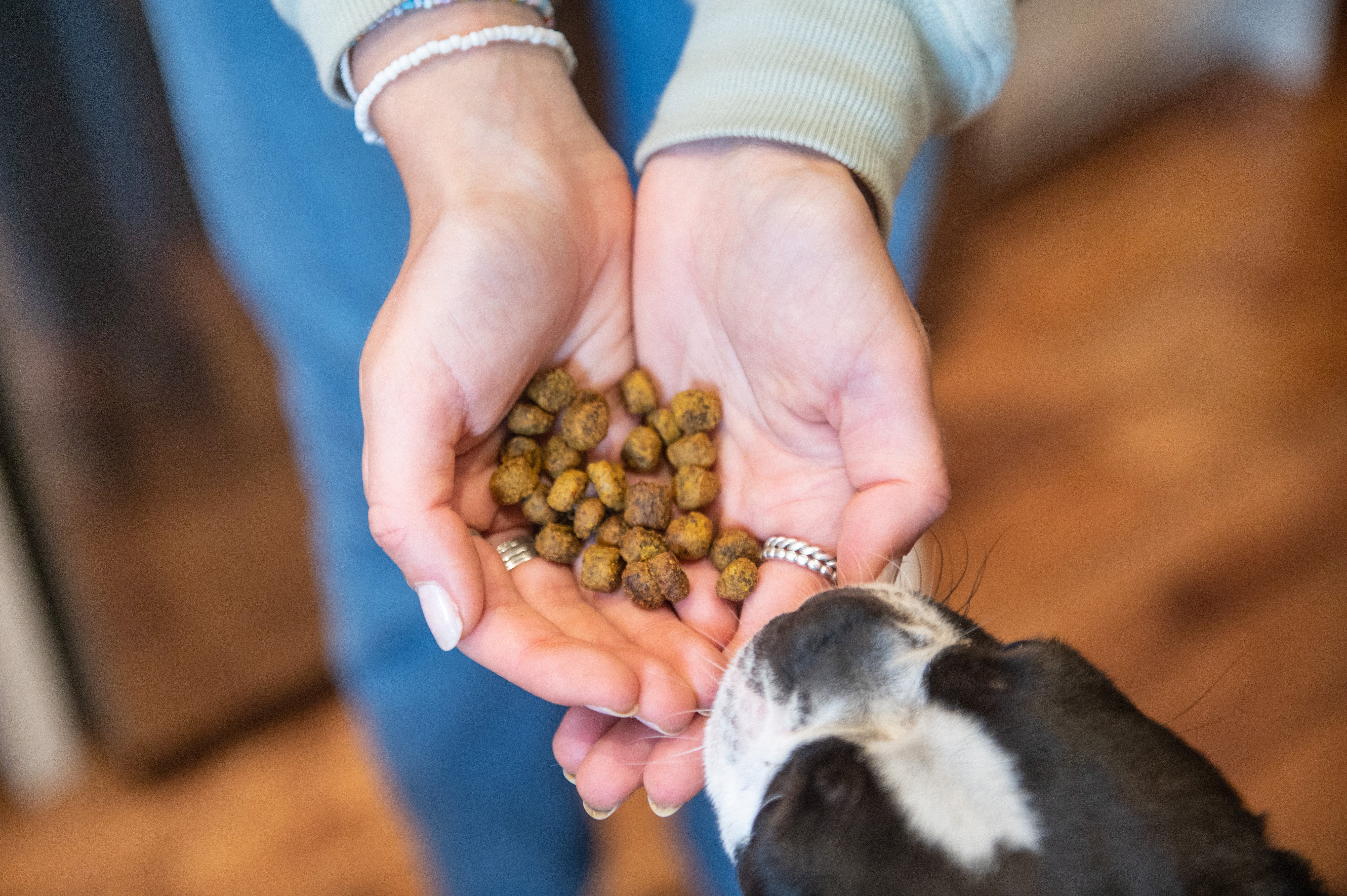Does your dog itch, scratch frequently, and bite its fur constantly? You changed its care routine, bought special shampoos, and even gave your pet medication, but nothing seems to do the trick?
But did you try to change your dog's diet?
Food allergies are one of the most common reasons dogs itch and scratch constantly. Researchers estimate that about 10% of dogs are affected by this type of allergy.[1]
Allergies, in general, are an exaggerated reaction of the body to a certain substance, which is not typically harmful. Thus, the immune system will act against these substances, considering them foreign (non-self).
Food allergies are less common than skin allergies. Owners often confuse these allergies with intolerances to some products or substances.
Most food allergies manifest through vomiting and diarrhea, but the symptoms can be much more severe than this.
It is recommended to feed your dog hypoallergenic food to prevent these allergies, especially if your veterinarian has informed you that your pet is prone to food allergies.
Food allergy causes
More than a third of dogs diagnosed with a certain type of food allergy are allergic to at least one other food (ingredient).
When a dog suffers from a food allergy, its immune system actually confuses a food or ingredient/substance in a food with a dangerous agent for health. As a result, the immune system triggers antibodies (immunoglobulins E) to neutralize the food or substance.
The next time your dog comes in contact with that allergen, even in a small amount, its body releases histamine, prostaglandins, and leukotriene, substances that cause the allergic reaction.
Depending on the body of each animal, any food ingredient can cause food allergies, including substances added to food, such as food additives or colorings.
In general, the main ingredients found in pet food that can cause food allergies are proteins, especially those from dairy products, lamb, chicken, or beef.
Some dogs may also be allergic to egg, soy, or wheat gluten. Other pets may also be allergic to various vegetables that are present in dog food, such as carrots or potatoes, although these cases are rare.
Food allergies can occur in any dog, regardless of its age or sex, but certain breeds are particularly prone to this medical condition:
- Labrador retriever
- Bichon
- German shepherd
- Boxer
- Dogo Argentino
- West highland white terrier
- Bulldog
- English Cocker Spaniel
- Schnauzer
Signs of a potential food allergy
Each dog will manifest differently, but the most common symptoms noticed in food allergies in pets are:[2]
- Intense scratching
- Rubbing its face on the carpet or other furniture pieces.
- Frequent shaking of the head.
- Chronic otitis.
- Biting the paws, tail, or bottom.
- Agitation.
- Anorexia, refusal of food, or lack of appetite.
- Disinterest in playing.
- Dandruff or excessively dry skin.
- Excessive hair loss.
- Excessively oily and greasy fur (healthy fur is shiny and non-itchy).
- Redness of the paws or skin.
- General lethargy or irritability.
- Eye infections and inflammation.
- Diarrhea, gas, vomiting, soft stools, etc.
Symptoms that are less common in food allergies:
- Runny nose
- Respiratory problems
- Seizures
- Urinary tract infections
- Weight loss
In reality, the dog will rarely show all the symptoms. Instead, it will have a slight to intense itching sensation throughout the body and possibly a chronic ear infection. In addition, allergic dogs often bite their paws until they become irritated, and red - paws are the only ones that have sweat glands, which can become inflamed in case of a food allergy.
Allergic dogs also rub their face on the carpet or sofa or scratch their sides and belly. As the wax glands in the ear go into overactivity in response to allergies, ear infections occur. Bacteria and yeasts often occur in excess wax and residue.
Skin lesions encountered in an allergic dog are usually the result of self-mutilation of the skin by biting and scratching.
Sometimes hair loss also occurs, which gives the dog a patchy look.
The skin can be dry, crusty, reddish, or oily, depending on the severity of the food allergy. Secondary bacterial skin infections are also common and can occur due to the lesions the dog causes itself through intense scratching and biting.
Food allergy treatment
Food allergies do not occur immediately after the first bite but develop over time after the dog's body has been exposed several times to that ingredient(s) that causes the immune system to react.
Mainly, the treatment for food allergies in dogs involves identifying the food to which your dog is allergic and avoiding feeding it with that food (also called the trial and error method). But this method is not always appropriate.
As mentioned earlier, dogs can be allergic to any ingredient in their food. Most commercial foods have about the same ingredients and your dog may already have been exposed to most types of animal protein.
Also, with this method, you will lose a lot of time until you find one that will help your dog. In all this period your four-legged friend will suffer.
Due to these reasons, it is recommended to try a hypoallergenic diet that has a totally new protein for your dog, such as Farmed Insects Recipe or Sustainable Fish Recipe for adult dogs. If you have an allergic puppy, you can try Farmed Insects Recipe and Sustainable Fish Recipe for puppies.
Insect dog food is a new diet that can help dogs that are allergic to common proteins. It contains Black Soldier Flies (BSF), which are a great source of proteins (~43%), calcium, and amino acids. This diet is one of the best hypoallergenic diets and looks and tastes exactly as standard dog food, so your dog wouldn’t tell the difference.
The fish recipes contain Asian carp (Silver carp) that has a similar nutritional profile to salmon, being rich in omega 3 and proteins.
Both recipes are enriched with vitamins and minerals to help repair damaged skin and fur and to promote health.
You can also give it a try with our hypoallergenic dog food samples for free before buying them. We are sure your dog will love it!
About The Writer:

Dr. Iulia Mihai is an experienced veterinarian, researcher, and medicine. She did her Bachelor's in veterinary medicine followed by a Doctor of Philosophy (PhD), Veterinary Medicine, and has over 10 years of experience in the field, she knows her way around animals. In addition to working with animals at a vet clinic, she also helps the team at Wilder Harrier help dog parents on topics such as health, allergies, diet, and care for pets.




